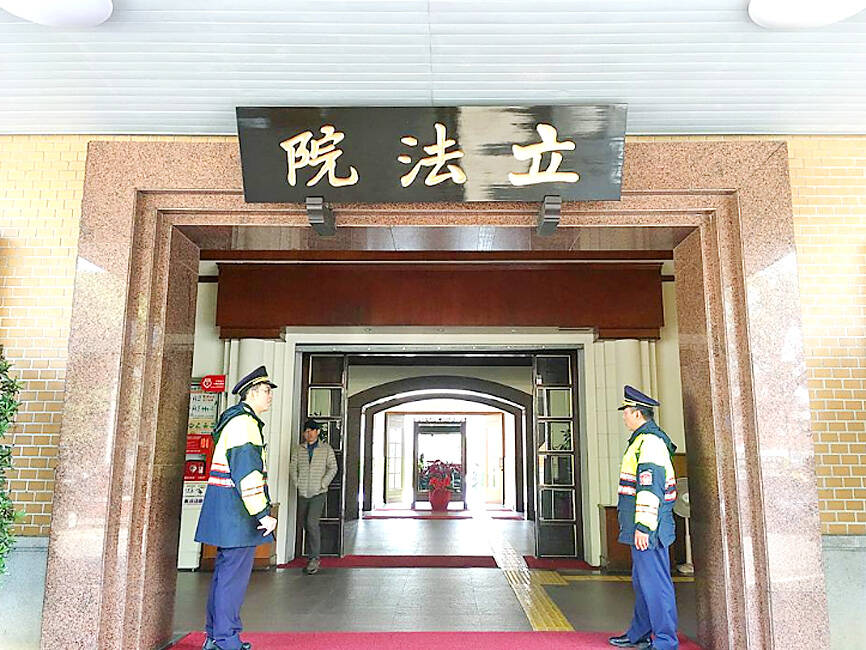Lawmakers across party lines have reached a consensus on some articles of a draft amendment that would loosen requirements for permanent residency.
The legislature’s Internal Administration Committee is to meet today to continue its review of draft amendments to the Immigration Act (入出國及移民法). Committee members have so far reached a consensus on some parts of the amendment, including the required length of stay in Taiwan for people to be eligible for permanent residence.
Under the amendment, holders of an Alien Permanent Resident Certificate would no longer be required to have lived in Taiwan for 183 days of every year, as long as they have been in Taiwan for that length of time on average over five years, the committee said.

Photo: Lin Liang-sheng, Taipei Times
This would add a degree of flexibility for foreign residents who stay in the country for longer periods in some years, but in other years go abroad for work or family matters, it said.
Committee members also reached an agreement on a stipulation that would change the rules for Taiwanese who do not have household registration in Taiwan (for example, those born abroad to Taiwanese parents).
Currently, they need to be in Taiwan for one year prior to applying for permanent residency, but the amendment would reduce the required length of stay to 335 days.
This would allow them to spend one month outside the country, in case there is a family emergency or other issue, the committee said.
Lawmakers also agreed to change a rule that affects foreigners who have divorced a Taiwanese if they have children in Taiwan from the marriage.
The current regulations stipulate that foreign divorcees can continue to reside in Taiwan only if they obtain custody of their dependent children after divorce. This would be annulled under the amendment.
Foreign divorcees who divorced due to domestic violence and have not remarried would also be allowed to continue their residence.

UNITED: The premier said Trump’s tariff comments provided a great opportunity for the private and public sectors to come together to maintain the nation’s chip advantage The government is considering ways to assist the nation’s semiconductor industry or hosting collaborative projects with the private sector after US President Donald Trump threatened to impose a 100 percent tariff on chips exported to the US, Premier Cho Jung-tai (卓榮泰) said yesterday. Trump on Monday told Republican members of the US Congress about plans to impose sweeping tariffs on semiconductors, steel, aluminum, copper and pharmaceuticals “in the very near future.” “It’s time for the United States to return to the system that made us richer and more powerful than ever before,” Trump said at the Republican Issues Conference in Miami, Florida. “They

GOLDEN OPPORTUNITY: Taiwan must capitalize on the shock waves DeepSeek has sent through US markets to show it is a tech partner of Washington, a researcher said China’s reported breakthrough in artificial intelligence (AI) would prompt the US to seek a stronger alliance with Taiwan and Japan to secure its technological superiority, a Taiwanese researcher said yesterday. The launch of low-cost AI model DeepSeek (深度求索) on Monday sent US tech stocks tumbling, with chipmaker Nvidia Corp losing 16 percent of its value and the NASDAQ falling 612.46 points, or 3.07 percent, to close at 19,341.84 points. On the same day, the Philadelphia Stock Exchange Semiconductor Sector index dropped 488.7 points, or 9.15 percent, to close at 4,853.24 points. The launch of the Chinese chatbot proves that a competitor can

TAIWAN DEFENSE: The initiative would involve integrating various systems in a fast-paced manner through the use of common software to obstruct a Chinese invasion The first tranche of the US Navy’s “Replicator” initiative aimed at obstructing a Chinese invasion of Taiwan would be ready by August, a US Naval Institute (USNI) News report on Tuesday said. The initiative is part of a larger defense strategy for Taiwan, and would involve launching thousands of uncrewed submarines, surface vessels and aerial vehicles around Taiwan to buy the nation and its partners time to assemble a response. The plan was first made public by the Washington Post in June last year, when it cited comments by US Indo-Pacific Commander Admiral Samuel Paparo on the sidelines of the Shangri-La Dialogue

MARITIME SECURITY: Of the 52 vessels, 15 were rated a ‘threat’ for various reasons, including the amount of time they spent loitering near subsea cables, the CGA said Taiwan has identified 52 “suspicious” Chinese-owned ships flying flags of convenience that require close monitoring if detected near the nation, the Coast Guard Administration (CGA) said yesterday, as the nation seeks to protect its subsea telecoms cables. The stricter regime comes after a Cameroon-flagged vessel was briefly detained by the CGA earlier this month on suspicion of damaging an international cable northeast of Taiwan. The vessel is owned by a Hong Kong-registered company with a Chinese address given for its only listed director, the CGA said previously. Taiwan fears China could sever its communication links as part of an attempt